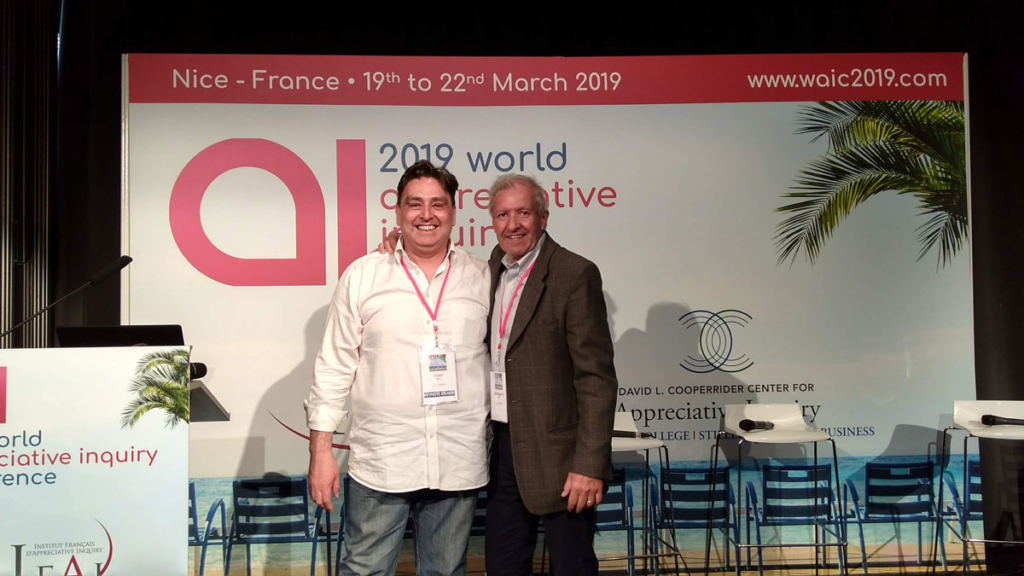
It was a pleasure to meet Félix Viloria Landaeta at WAIC2019 in Nice, France last year, where he shared his moving and inspirational story which clearly resonated deeply with attendees. His inviting smile reflects the enthusiasm with which he embraces his work in the Appreciative Inquiry (AI) space. Félix is our contributor to Voices from the Field in this Issue of AI Practitioner, where explains his understanding of what it is to be appreciative, his growth as an AI practitioner, and the welcome influence his mother has had on what he eventually chose to do with his life.
Stories that boosted me: Appreciate, celebrate and value what is in you and in front of you, as it is

Félix Viloria Landaeta | Colombia
Félix Viloria Landaeta is a Venezuelan Appreciative Inquiry practitioner based in Colombia. In recent years, he has been dedicated to facilitating dialogues and accompanying leaders and organizations in building a more inclusive and humane vision with their work teams through the construction of an appreciative ethic. He is also an Appreciative Executive and Life Coach and Managing Partner of the firm Cresiendo Consultores.
Since I began in the world of Appreciative Inquiry, I have become aware that I live in a constant internal dialectic. Like any other person, I debate daily between the good or the bad, the beautiful or the ugly, what I like or what I don’t like. And I realize that that’s fine! But, in addition, I have gone a step further and have learned to ask myself, what do I do with that internal dialogue? Which side of the story do I choose to stay with? How do I put it at my service and at the service of the welfare of others?
What to do with the internal dialogue when you have grown up in a ‘think wrong and you’ll get it right’ culture?
I spent much of my corporate career supporting and leading strategic planning processes. I held on to the apparent “truth” that the worst-case scenario always had to be considered and, therefore, I always looked for the flaw in any idea. With the healthy intention of challenging the conversation, I focused on finding what was not right by listening to the negative, the doubts and fears that arose in my mind. This eclipsed the possibility of appreciating any proposal in an integral way. I was trained to identify failure. Even on a personal level, I was always aware of what was wrong or what could potentially fail. I was an expert in “pricking the balloons” of any idea. I measured my success on the number of proposals that did not pass my “filter” or the discussions I won by highlighting the weakness in the approaches of others. The balance of the dialogue was totally inclined towards the negative. While people appreciated the fact that I showed them what was not right in their plans, the way I did it was far from being perceived as good intention.

I continue to learn to use this negative internal dialogue of doubts and fears, and to put it at the service of asking questions that generate possibilities instead of making judgments, of focusing my intention on how to improve the idea, not how to discard it.
Listening consciously is a daily challenge. It has involved listening to the other from a space of openness and humility in order to identify the possibilities and, in addition, to listen to myself to identify when my internal dialogue moves me away from that purpose and to redirect it to the service of the objective.
Which side of the story do I choose to stay with?

Félix’s mother
By chance, I saw a video of the AQUARIUS IMPARABLE PROGRAM. In it, I heard the phrase “desire is not a matter of age” and I could not help but recall my mother’s life story. She died recently at the age of 82.
Her childhood wasn’t easy. She was the second of thirteen siblings of whom only five survived, which meant she became the older sister. Having lost her father at a very young age and with a widowed mother who was sick, worn down by pain, and without encouragement or enthusiasm meant that, from the age of eight, my mother had to work to help support the family.
Despite growing up in such a harsh environment, my mother told her story with joy, never with resentment or regret. Was there pain in her life story? I believe so. But I am convinced that she chose to keep what made her happy during those rough moments.
During my adolescence and then into my adulthood, she always told me “look at everything you’ve achieved so far, you can do it, you deserve it, go for it!” The life stories that she chose to share inspired me, encouraged me to develop, and convinced me to prosper and live a full life. I realize that, unconsciously and naturally, my mother had embraced the positive and flourished. Her enthusiasm for living, exploring and discovering new things was the driving force to who I am today and my choice to live and work appreciatively.
A little more than a year ago, my good friend Santiago Otero and I were in Argentina philosophizing about what it is to BE APPRECIATIVE and we managed to articulate this statement: “feel, think, talk, act and relate with others from the conscious choice of perceiving, recognizing and amplifying the valuable and meaningful in people, events and things”.
It was wonderful to be able to articulate the ability to “appreciate” as concrete actions, but even more wonderful was the fact of declaring it as a “conscious choice”. This gained a total relevance in my professional spectrum and, more deeply, a new perspective in my personal sphere. This conscious choice complements my listening. It invites me to reorient my internal conversation to strengthen my relational capacity; to retrain my brain to identify success.
Progressively, with the practice of AI, I have incorporated the daily choice of staying on the side of the positive, which makes me look at the negative from a different viewpoint and approach it with better energy. From this view, the negative serves as a reference to understand what I do want: to understand the other point of view, to form a criterion, to include, to learn. Only from there have I been able to support others to go through change, to leave behind conversations that lead to separation, and to find a point of convergence.
To exclude the negative is to exclude part of the story. With AI, I have learned to look at and embrace the negative with the intention and purpose of giving voice to the entire system in the organizations with which I work. My challenge has been how to refocus it, how to approach it so that in the end it results in realizing the longings and aspirations of those overwhelmed and seeking to achieve their dreams.
It is undeniable that considering organizational dynamics is just the beginning of working towards a different path in terms of the construction, rather than identification, of business opportunities. Moving from Strengths, Weaknesses, Opportunities, Threats (SWOT) to Strengths, Opportunities, Aspirations, Results (SOAR), for example, requires leaders to understand that it is not about concealing or eclipsing the negative, but looking at it from the perspective of opportunity and abundance.
How to put the internal dialogue at my service and at the service of the welfare of others?
One of the exercises I use in my consulting practice with clients, when conflict between parties is present, is designed to unleash the creative potential. This involves mapping the entire relational system and giving voice to each component through the construction of a map of empathy, an extremely helpful way to externalize the dialogues that occur within each team member. At first, they are resistant and afraid to open this space of putting themselves in the place of the other and to answer these questions: “What would they say? How do they feel? What do they think? What do they need? From where are they focusing the situation? What do they see?” Once they engage in this dialogue, they discover possibilities that were not as clear before. Listening to what they deem negative from their counterparts makes it possible to build what they want to happen, to find convergences and move towards the goal.
Inviting us to move from opposition to acceptance, however contrary ideas may be, allows us to recognize that we coexist with others, that their presence is a fact, and they all have a place in the system. This space of coexistence and cohabitation inspires a new look at the reconstruction of relational systems as it encourages listening to and recognizing the aspirations of all.
We have the power to use actions and words to judge and label, or to promote wellbeing. It is a choice that can crucially change the future of organizations and of us as human beings.
The more positive the internal dialogue, the more positive the emotion and, therefore, the more positive the action. The image we make to the world is a product of the oscillation of our thinking between good and bad. Daring to listen and redirect the internal dialogue – about ourselves, about others and about situations – takes us to the space of consciousness and connection.
In addition to loving our neighbours, we also must like and appreciate them. We need, then, to tell ourselves new stories that arouse that admiration. That can only be possible with openness and acceptance.

Keith is a registered psychologist with the Psychology Board of Australia (PsyBA) and associate fellow with the Australasian College of Health Service Management (ACHSM). He has designed and implemented health and wellbeing frameworks across the community, health and education sectors. Keith’s current focus is on developing his work in Appreciative Dialogue (ApDi) to assist individuals in moving from self-doubt to inspired positive action.

